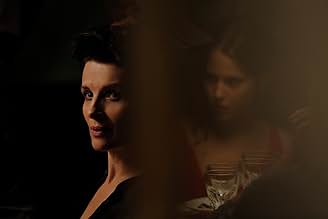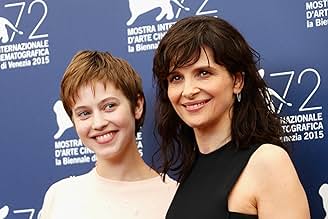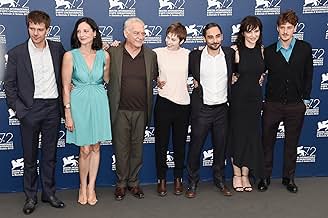AVALIAÇÃO DA IMDb
6,5/10
2,7 mil
SUA AVALIAÇÃO
Adicionar um enredo no seu idiomaA mother unexpectedly meets her son's fiancée at a villa in Sicily and gets to know her as she waits for her son to arrive.A mother unexpectedly meets her son's fiancée at a villa in Sicily and gets to know her as she waits for her son to arrive.A mother unexpectedly meets her son's fiancée at a villa in Sicily and gets to know her as she waits for her son to arrive.
- Direção
- Roteiristas
- Artistas
- Prêmios
- 7 vitórias e 9 indicações no total
Avaliações em destaque
This visually beautiful, if self-consciously arty, Italian film marks the feature debut of Piero Messina who certainly displays all the promise of a major film-maker if he can only learn to move things along at a somewhat more acceptable pace and be less concerned with the 'look' of his films and more concerned with the feelings of his characters. This is a somewhat high-toned piece based on a play by Pirandello and it's very much designed around the performances of Juliette Binoche as a grieving mother and Lou de Laage as her son's girlfriend. It's certainly well done but it also smacks of the worst kind of art-house cinema; this is Antonioni-light. See it by all means though you may have to keep pinching yourself from time to time to stay awake.
Anna's house is in mourning. As the mirrors are covered and the doors a locked, an unexpected guest walks through the front door. It's Jeanne, the girlfriend of her son, who had arrived to spend the Easter with him and his family. Seeing the opportunity to take her mind of her sadness Anna embraces Jeanne with all hear heart. But as the days go by, and her son does not appear, will she be able to tell Jeanne the terrible truth?
Piero Messina – assistant director of the Italian Oscar winner Great Beauty, creates a movie full of symbolism. With every frame holding some sort of meaning, the film is beautiful and deep, like the Sicilian lake on the border of which the story takes place.
THE WAIT is quite a cinematic journey for a small film, which is basically focused on two performances. Playing with themes of resurrection, the movie unravels to us the picture of grief, and by the end it will stand before us, truly exposed, just like unveiled statue of Virgin Mary in the final scenes.
Juliette Binoche is a great performer and she has an interesting role here. Her Anna is deeply damaged but climbing to life, finding a relief in her son's girlfriend's visit. For young and charismatic Lou de Laage in the role of Jeanne this is a big step up from her previous roles of troubled teenagers and shows just how much she grew up as an actor.
Focusing on the developing friendship between the two very different women, the movie always balances on the edge, where a few words can end everything.
With its beautiful imaginary and haunting score, THE WAIT is still not an easy experience, but it has the charm of a dark fairy tale and quickly draws you in. This is an intelligent piece of cinema that will benefit from multiple viewing.
Piero Messina – assistant director of the Italian Oscar winner Great Beauty, creates a movie full of symbolism. With every frame holding some sort of meaning, the film is beautiful and deep, like the Sicilian lake on the border of which the story takes place.
THE WAIT is quite a cinematic journey for a small film, which is basically focused on two performances. Playing with themes of resurrection, the movie unravels to us the picture of grief, and by the end it will stand before us, truly exposed, just like unveiled statue of Virgin Mary in the final scenes.
Juliette Binoche is a great performer and she has an interesting role here. Her Anna is deeply damaged but climbing to life, finding a relief in her son's girlfriend's visit. For young and charismatic Lou de Laage in the role of Jeanne this is a big step up from her previous roles of troubled teenagers and shows just how much she grew up as an actor.
Focusing on the developing friendship between the two very different women, the movie always balances on the edge, where a few words can end everything.
With its beautiful imaginary and haunting score, THE WAIT is still not an easy experience, but it has the charm of a dark fairy tale and quickly draws you in. This is an intelligent piece of cinema that will benefit from multiple viewing.
"L'Attesa" (2015 release from Italy; 99 min.; English title: "The Wait") brings the story of two women. As the movie opens, we see Anna (played by Juliette Binoche) at a church service, it looks like a funeral. Not long thereafter, Anna gets a phone call, during which she mentions "He's not here, I'm his mother, but come on over". Shortly thereafter, a young lady named Jeanne arrives at the estate (in Sicily, we later learn). She is the girlfriend of Anna's son Giuseppe. Anna tells her that Giuseppe will be back later in the week, in time for Easter. Where is Giuseppe? Why won't he take Jeanne's calls? What is really going on here? To tell you more would spoil your viewing experience, you'll just have to see for yourself how it all plays out.
Couple of comments: this is the feature debut of Italian writer-director Piero Messina, who previously was assistant-director in the Oscar-winning "The Great Beauty". Here, he builds a mystery as to why Giuseppe is absent, when he might return (or not) and what really happened to him. We are left guessing from start to finish, while we see the great Juliette Binoche deliver another towering performance as she grieves (whose funeral was that anyway? do we really believe it when Anna tells Jeanne "My brother died"?), Up-and-coming French actress Lou de Laâge as Jeanne is equally outstanding, a new talent we surely have not seen the last of. As mentioned, the movie is set in Sicily, which I typically do not associate with lakes and water, both of which are prominent in the film. Last but certainly not least, there is a ton of great music in the movie, both the original score (which director Messina co-composed I might add) and songs placements. There is a note-worthy scene in the movie which plays out as Leonard Cohen's "Waiting for the Miracle" is blaring, and the XX's "Missing" plays over the movie's end credits. There couldn't have been a more appropriate song to close out the movie.
"L'Attesa" opened this weekend at my local art-house theater here in Cincinnati and I couldn't wait to see it. The Friday early evening screening where I saw this at turned out to be a private screening: I was literally the only person in the theater, to my surprise. That said, it is clear that this movie is going to struggle to find a large audience: it is slow-moving, with no clear resolutions, and "all talk, no action". These are not criticisms as far as I'm concerned, au contraire, I found myself mesmerized by the way the movie unfolded, and this flew by in no time. If you are in the mood for a somber but top-notch foreign film dealing with grief, absence, and longing, I'd encourage you to check this out, be it in the theater, on VOD or eventually on DVD/Blu-ray. "L'Attesa" is HIGHLY RECOMMENDED!
Couple of comments: this is the feature debut of Italian writer-director Piero Messina, who previously was assistant-director in the Oscar-winning "The Great Beauty". Here, he builds a mystery as to why Giuseppe is absent, when he might return (or not) and what really happened to him. We are left guessing from start to finish, while we see the great Juliette Binoche deliver another towering performance as she grieves (whose funeral was that anyway? do we really believe it when Anna tells Jeanne "My brother died"?), Up-and-coming French actress Lou de Laâge as Jeanne is equally outstanding, a new talent we surely have not seen the last of. As mentioned, the movie is set in Sicily, which I typically do not associate with lakes and water, both of which are prominent in the film. Last but certainly not least, there is a ton of great music in the movie, both the original score (which director Messina co-composed I might add) and songs placements. There is a note-worthy scene in the movie which plays out as Leonard Cohen's "Waiting for the Miracle" is blaring, and the XX's "Missing" plays over the movie's end credits. There couldn't have been a more appropriate song to close out the movie.
"L'Attesa" opened this weekend at my local art-house theater here in Cincinnati and I couldn't wait to see it. The Friday early evening screening where I saw this at turned out to be a private screening: I was literally the only person in the theater, to my surprise. That said, it is clear that this movie is going to struggle to find a large audience: it is slow-moving, with no clear resolutions, and "all talk, no action". These are not criticisms as far as I'm concerned, au contraire, I found myself mesmerized by the way the movie unfolded, and this flew by in no time. If you are in the mood for a somber but top-notch foreign film dealing with grief, absence, and longing, I'd encourage you to check this out, be it in the theater, on VOD or eventually on DVD/Blu-ray. "L'Attesa" is HIGHLY RECOMMENDED!
Too slow, borderline unwatchable. It's 100 minutes but it felt at least 150. It should have been at least 20 minutes shorter. The worst thing is that it plays like a mystery, and there are no mysteries here, even though director tries hard to make it a bit enigmatic and cryptic. If it was a "pure" drama movie, without the "mystery" element, it could have been a good, even great. Because there are positives here, it's well acted and well directed. Juliette Binoche is so charismatic that she almost turns this boredom into an interesting movie. Furthermore, cinematography is nice and overall, movie's technical aspects are above average.
Yet, it's a failure. This could have been good because Binoche's motives for doing what she did, are crystal clear to me. I understood what she's going through and why she behaves like this. But still, the mystery element is unnecessary.
Ending was great.
Yet, it's a failure. This could have been good because Binoche's motives for doing what she did, are crystal clear to me. I understood what she's going through and why she behaves like this. But still, the mystery element is unnecessary.
Ending was great.
There is a kind of celebration that is cathartic and without it, grief can not release itself from its prison. In the space between loss and acceptance, lie denial and the hope for a miracle, for the light to shine through the heart.
In this extraordinary period of denial, time stretches into moments of grief, anger and hope, the meeting of reality with the loss of love is undefined, is fated to be revealed but if it can not, then the actions of those frozen in that vast expanse of waiting can not be predicted.
This is calm before the storm but the storm never arrives, it is the house that creaks with the stuff of haunting but the ghosts only wander into dreams.
L'attesa (The Wait) is shot in an old Sicilian villa, it moves in lingering pauses in which the exalted photographic beauty of this extended suspension, truth attempting to surface but underwater. Binoche carries the deepening mystery in precise nuanced expression. The nails hammered into the walls to shroud mirrors, the lime annointment of olive trees bleaches the trunk bone white, and awaiting the miracle, knowing in truth is freedom, unable to see past belief and hope.
Excellent film in every respect, music, photography and direction. Resolution is unavailable as the echoes of celebration fade.
In this extraordinary period of denial, time stretches into moments of grief, anger and hope, the meeting of reality with the loss of love is undefined, is fated to be revealed but if it can not, then the actions of those frozen in that vast expanse of waiting can not be predicted.
This is calm before the storm but the storm never arrives, it is the house that creaks with the stuff of haunting but the ghosts only wander into dreams.
L'attesa (The Wait) is shot in an old Sicilian villa, it moves in lingering pauses in which the exalted photographic beauty of this extended suspension, truth attempting to surface but underwater. Binoche carries the deepening mystery in precise nuanced expression. The nails hammered into the walls to shroud mirrors, the lime annointment of olive trees bleaches the trunk bone white, and awaiting the miracle, knowing in truth is freedom, unable to see past belief and hope.
Excellent film in every respect, music, photography and direction. Resolution is unavailable as the echoes of celebration fade.
Você sabia?
- Curiosidades"L'attesa" is a period of time whose duration is unknown and therefore it symbolizes a real act of faith. In this case, this act for Anna and Jeanne consists in waiting for the return of Giuseppe, the son of Anna and Jeanne's boyfriend, with the difference that the first knows the truth, while the second lives in the mystery. The return of Giuseppe takes on the meaning of a miracle. The song "Waiting for the miracle" emphasizes this detail.
- Erros de gravaçãoAbout one half hour into the movie Binoche cracks an egg into a frying pan, thereby breaking the yolk. However, when she serves it to her son's girlfriend the yolk is whole.
- Citações
Anna Remigi: Jealousy means that there is still desire.
- ConexõesFeatures A Casa Intolerante (1959)
- Trilhas sonorasOrchestral Loop
Music by Ben Lukas Boysen
Published by Erased Tapes Music
Principais escolhas
Faça login para avaliar e ver a lista de recomendações personalizadas
- How long is L'attesa?Fornecido pela Alexa
Detalhes
Bilheteria
- Orçamento
- € 3.200.850 (estimativa)
- Faturamento bruto nos EUA e Canadá
- US$ 55.804
- Fim de semana de estreia nos EUA e Canadá
- US$ 5.686
- 1 de mai. de 2016
- Faturamento bruto mundial
- US$ 1.010.766
- Tempo de duração
- 1 h 40 min(100 min)
- Cor
- Proporção
- 2.35 : 1
Contribua para esta página
Sugerir uma alteração ou adicionar conteúdo ausente

















